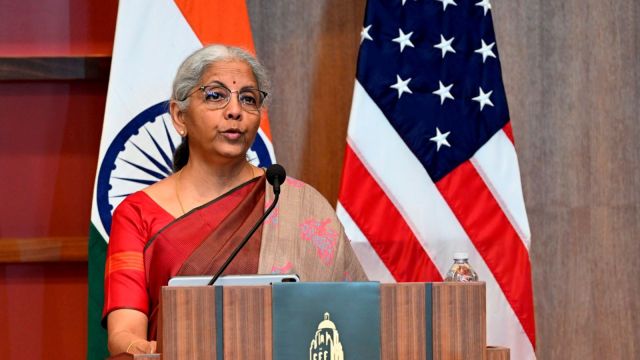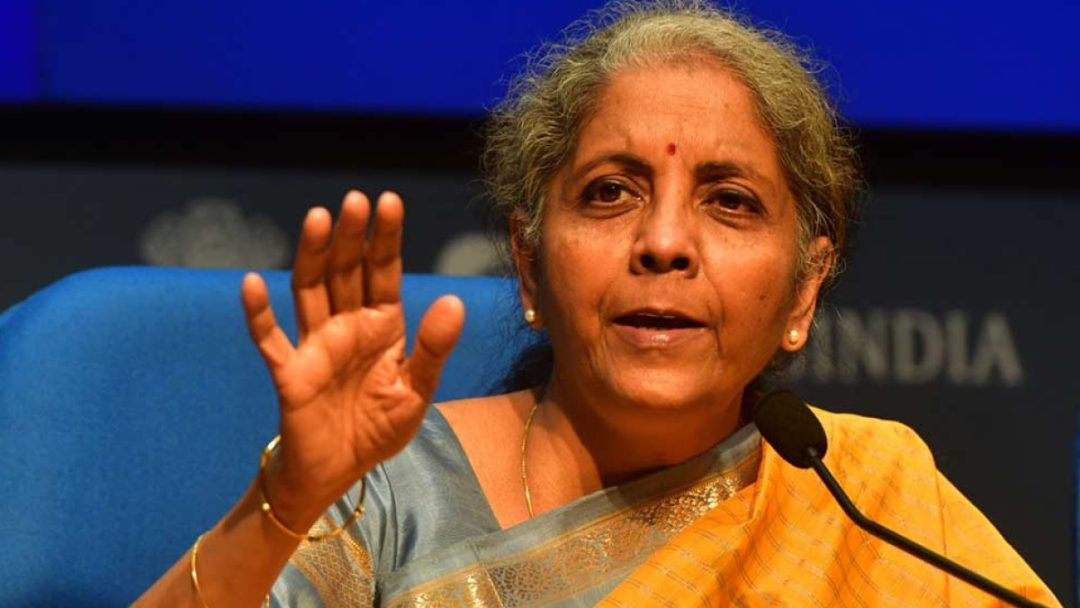Sitharaman said that India has seen a rapid growth in service sectors such as the gig economy, but manufacturing is not to be left aside.
Scaling up manufacturing is essential to absorb a youthful workforce, reduce import dependencies and build competitive global supply chains, Union Finance Minister Nirmala Sitharaman said on Monday in San Francisco. Sustaining India’s growth momentum over the next two decades calls for a fresh approach grounded in bold reforms, stronger domestic capacities, renewed institutional partnership and adaptive strategies suited for the evolving global landscape, she said.
Commenting on the recent global developments, Sitharaman said they may appear “formidable”, yet they are full of possibilities, adding that India and the US can collaborate in several sectors including semiconductors, power generation, quantum computing and pharmaceuticals.
“New opportunities for deeper participation present themselves. The United States and India have enjoyed a long-standing economic collaboration which can be strengthened to enable industry participation and partnership and investments in several key sectors. Semiconductors, nuclear power generation, quantum computing, and pharmaceuticals come to my mind as frontier areas of collaboration,” she said while delivering the keynote address on ‘Laying the foundations for a developed India Viksit Bharat by 2047’, at the Hoover Institution, Stanford University, in California.
Why India needs to focus on manufacturing
The Finance Minister said India has risen from the 10th largest economy in the world to the fifth largest economy in just five years, which is a sign of India’s “growing strength and global relevance”. Underlining that manufacturing is a key engine for transformation, Sitharaman said manufacturing is a force multiplier for services sector growth and not so much the other way round. “Manufacturing binds societies and leads and lends cohesion to communities by providing employment opportunities and financial strength to communities. In the post Covid world, manufacturing enhances national security also… it creates forward and backward linkages, catalyses skilling, and pushes demand for infrastructure and governance reforms. For India, scaling up manufacturing is essential to absorb a youthful workforce, reduce import dependencies and build competitive global supply chains,” she said.
When asked about the declining trend seen in manufacturing jobs in other countries, especially the developed world, Sitharaman said that India has seen a rapid growth in service sectors such as the gig economy, but manufacturing is not to be left aside. The government hopes to increase the contribution of manufacturing in India’s GDP to 22-23 per cent from 12 per cent, she added.
“In India’s GDP, the service sector’s contribution is about 64 per cent and if that is one side, at the lower end, the gig economy’s growth is rapid. In fact, if 7.1 million people are in the gig economy today, as of 2021-22 data, we expect that to go to 230 million by 2030. That’s not manufacturing. Similarly, your 64 per cent contribution is also not from manufacturing, it is from service sector, it could be IT related or it could be fintech related, it could be education, health related. So the service sector disproportionately contributes both to the GDP and to employment… but that’s not to say manufacturing should be left aside. We have been hoping to increase the contribution of manufacturing from 12 per cent to about 22-23 per cent,” she said.
The government is focusing on incentivising 14 sectors through the production-linked incentives (PLI) and sunrise sectors such as semiconductors, renewable energy components, medical devices, batteries, along with other schemes such as the Hydrogen Mission, she said.
For the goal of a developed India, Sitharaman said there is a need to stay committed to long-term goals, without losing sight of present realities. “The global order is changing. That poses challenges but also opportunities. We must be prepared to tackle the former while seizing the latter. A Viksit Bharat will be shaped not only by the government but by the collective effort of every citizen. This vision calls upon us to think boldly, act inclusively, and stay resilient and flexible,” she said.
What Sitharaman said about Apple’s manufacturing shift, impact of US tariffs
She also cited the success seen in the case of smartphone maker Apple’s manufacturing numbers from India. “…we have come up with schemes which will support them (manufacturers). And that has paid off as well. That is why you found Apple phone manufacturing has shifted to India from China, I would think, with its entire ecosystem. Today most of the manufacturing which happens, particularly those which are being exported from India, particularly for Apple, nearly 60 per cent is manufactured in India. That was a very quick and rapid policy driven support for bringing that entire ecosystem to India,” she said.
For 14 sectors, PLIs are being offered for every additional unit produced and exported, there is an incentive from the government, and that is aimed at such sectors which also will have greater employment potential, she said. “So on the one hand, electronic and electronic goods, similarly, labour-intensive sectors like textiles, leather and footwear, these sectors are being given incentives,” she said.
When asked about the recent tariff-related actions by the Trump administration in the US and its impact on India, Sitharaman said when there is stability in government, consistency in policy, a predictability in tax regime, investments and growth can be planned and executed to a large extent. “Even in this kind of global uncertainty, I would think that is primarily the reason why India continues to be the fastest growing economy. It is that stability which people of India voted for, which I think is the biggest strength with which today we were one of the earliest to approach the new administration in the United States to talk trade, to start the negotiation as it were for a trade deal and if anything India’s biggest and the topmost trading partner is United States of America and that importance is not lost on today’s government in India,” she said.



